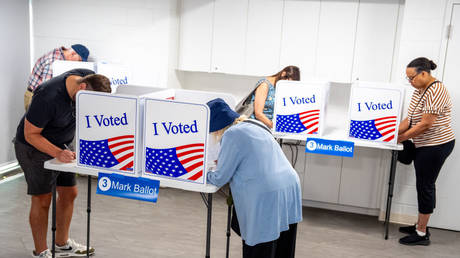Last month, in and around Asheville, N.C., local television and radio stations reprised their role as vital information lifelines to combat the waves of online disinformation driven by doctored photos and videos in the aftermath of Hurricane Helene. Our stations’ on-the-ground reporting offered a battered community necessary information about the ongoing safety of its local dams, real-time delivery details for water and other resources and a lifeline that reconnected citizens with their loved ones. Consequently, unnecessary evacuations were avoided and lives were saved.
Now, as voters head to the polls today, local broadcasters will again be on the front lines as our democracy faces one of its most pivotal tests. Amid an unprecedented wave of misinformation and digital manipulation, local broadcast journalists will be equipped to deliver truth and transparency to the electorate — whatever the result — on and in the days following the election.
Across the nation, local television and radio station newsrooms have been working day and night to inform, engage and empower voters, building trust in the election process and ensuring communities have the facts they need as they cast their ballots. Yet the work to cover this election with fact-driven journalism informed by our uniquely local vantage point started years ago as broadcasters redoubled our efforts to ensure the veracity of our fact-based information and journalism.
To start, local broadcasters invested in new technologies that allow us to verify facts in real-time. These efforts, combined with new initiatives such as VERIFY, elDetector, T Verifica and FactCheck.org, allow us to better dispel misinformation and deepfakes through rigorous fact-checking. Our members also devoted significant resources to train our thousands of broadcast journalists across the country to quickly recognize manipulated images and misleading claims.
Finally, stations across the country launched initiatives like Martes de Acción to empower Latino communities and ensure all legally eligible voters, from diverse backgrounds and languages, have a clear path to electoral participation.
As a result, voters trust that their local stations will be there for them, fielding real-time coverage and providing context for every twist and turn. Broadcasters bring the unique strength of local knowledge and trusted voices to a national stage. Every debate, every town hall, every hour of election night coverage is an opportunity to replace chaos with clarity, ensuring every voter understands the facts behind the vote.
Of course, our audiences have already seen firsthand broadcasters’ dedication to truth and transparency, whether it’s through ABC News’s presidential debate, CBS News’s vice-presidential debate, TelevisaUnivision’s town halls covering issues central to Hispanic communities, or any of the thousands of congressional, gubernatorial and local debates organized and moderated by our stations and their network partners in communities nationwide.
As the last ballot is cast and the results come in over the coming days and weeks, local stations will be there, working alongside their communities to uphold trust in our democracy and reinforce confidence in the election process and its outcomes. In a world overflowing with competing narratives, broadcasters remain committed to delivering what voters need most today: truth and trust, free from interference.
Yet, even as we serve our communities, broadcasters increasingly face threats to their ability to do their jobs — either physically through verbal intimidation and violence directed towards our journalists, or politically through threats of broadcast license or spectrum revocations and harassing lawsuits. As you reflect on our election coverage this week and over the course of this cycle, be mindful that these pressures to limit or even revoke the rights of newsrooms to operate without interference pose a serious threat to our ability to fulfill this civic responsibility.
Every limitation placed on the press pulls us further from a free and open society. Protecting the First Amendment is not just about preserving a right — it is essential to safeguarding this mission. It allows broadcasters to continue empowering their communities with the truth that strengthens our democracy and defends the freedoms we hold dear.
As Ellen Crooke, TEGNA’s senior vice president of news, recently said, “The greatest tool to decipher false information is journalism. Local broadcasters must work not only to search for the truth, but also stop the spread of false information.â€
I could not agree more, and I am confident that this week, as local broadcasters deliver the truth our nation needs, Americans will see firsthand the strength and confidence in our institutions that only an informed democracy can bring.
Curtis LeGeyt is president and CEO of the National Association of Broadcasters.
